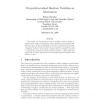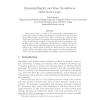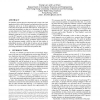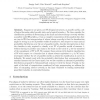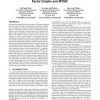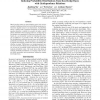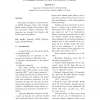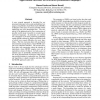125
click to vote
SYNTHESE
2010
14 years 8 months ago
2010
The notion of a proposition as a set of possible worlds or states occupies central stage in probability theory, semantics and epistemology, where it serves as the fundamental unit...
152
click to vote
KBS
2011
14 years 9 months ago
2011
Order-sorted logic is a useful tool for knowledge representation and reasoning because it enables representation of sorted terms and formulas along with partially ordered sorts (c...
120
click to vote
CORR
2011
Springer
14 years 9 months ago
2011
Springer
There are numerous applications where we have to deal with temporal uncertainty associated with events. The Temporal Probabilistic (TP) Logic Programs should provide support for v...
121
click to vote
PVLDB
2010
15 years 15 days ago
2010
Set similarity join has played an important role in many real-world applications such as data cleaning, near duplication detection, data integration, and so on. In these applicati...
109
click to vote
TCS
2008
15 years 2 months ago
2008
Suppose we are given a set W of logical structures, or possible worlds, a set of logical formulas called possible data and a logical formula . We then consider the classification p...
135
click to vote
CORR
2010
Springer
15 years 2 months ago
2010
Springer
Incorporating probabilities into the semantics of incomplete databases has posed many challenges, forcing systems to sacrifice modeling power, scalability, or treatment of relatio...
125
click to vote
ICDE
2010
IEEE
15 years 2 months ago
2010
IEEE
— Emerging uncertain database applications often involve the cleansing (conditioning) of uncertain databases using additional information as new evidence for reducing the uncerta...
106
click to vote
AAAI
2010
15 years 2 months ago
2010
When merging belief sets from different agents, the result is normally a consistent belief set in which the inconsistency between the original sources is not represented. As proba...
COLING
1994
15 years 3 months ago
1994
This paper introduces a semantic theory I)I,PW, l)ynamic l,ogic with Possible World, which extends Groenendijk's I)PI, and Cresswell's Indices Semantics. The semantics c...
128
click to vote
IJCAI
2001
15 years 3 months ago
2001
A new, general approach is described for approximate inference in first-order probabilistic languages, using Markov chain Monte Carlo (MCMC) techniques in the space of concrete po...
